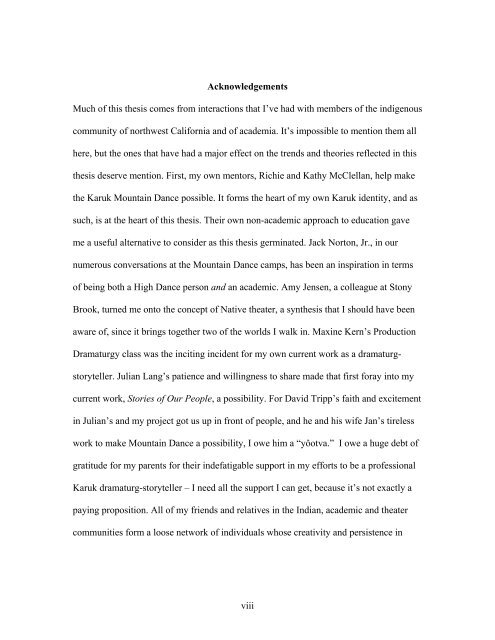The Intersection of Karuk Storytelling and Education
The Intersection of Karuk Storytelling and Education The Intersection of Karuk Storytelling and Education
Acknowledgements Much of this thesis comes from interactions that I’ve had with members of the indigenous community of northwest California and of academia. It’s impossible to mention them all here, but the ones that have had a major effect on the trends and theories reflected in this thesis deserve mention. First, my own mentors, Richie and Kathy McClellan, help make the Karuk Mountain Dance possible. It forms the heart of my own Karuk identity, and as such, is at the heart of this thesis. Their own non-academic approach to education gave me a useful alternative to consider as this thesis germinated. Jack Norton, Jr., in our numerous conversations at the Mountain Dance camps, has been an inspiration in terms of being both a High Dance person and an academic. Amy Jensen, a colleague at Stony Brook, turned me onto the concept of Native theater, a synthesis that I should have been aware of, since it brings together two of the worlds I walk in. Maxine Kern’s Production Dramaturgy class was the inciting incident for my own current work as a dramaturgstoryteller. Julian Lang’s patience and willingness to share made that first foray into my current work, Stories of Our People, a possibility. For David Tripp’s faith and excitement in Julian’s and my project got us up in front of people, and he and his wife Jan’s tireless work to make Mountain Dance a possibility, I owe him a “yôotva.” I owe a huge debt of gratitude for my parents for their indefatigable support in my efforts to be a professional Karuk dramaturg-storyteller – I need all the support I can get, because it’s not exactly a paying proposition. All of my friends and relatives in the Indian, academic and theater communities form a loose network of individuals whose creativity and persistence in viii
making the world a more beautiful place are to thank for supporting me as well. Any errors in this, of course, are my own. ix
- Page 1 and 2: Stony Brook University The official
- Page 3 and 4: Copyright by Waylon Conrad Lenk 201
- Page 5 and 6: Abstract of Thesis The Intersection
- Page 7 and 8: Dedication Page This thesis is dedi
- Page 9: List of Figures Fig. 1. The Hover C
- Page 13 and 14: seven minutes, three-quarters of th
- Page 15 and 16: am a Káruk-ára from the villages
- Page 17 and 18: The Káruk-aráara have lived on th
- Page 19 and 20: Chapter 2: Classic Káruk Education
- Page 21 and 22: made at Weɫkwäu at the mouth of t
- Page 23 and 24: wealth. A key to understanding indi
- Page 25 and 26: activity between menstruating women
- Page 27 and 28: structure. As such, it would be cou
- Page 29 and 30: 19 th century American theorist Lew
- Page 31 and 32: mainstream American life, the feder
- Page 33 and 34: Or, more to the point, “I am the
- Page 35 and 36: pedagogically linked to both Arnold
- Page 37 and 38: movement that coincided with the re
- Page 39 and 40: precursor to his later book with Gi
- Page 41 and 42: second books is merely a continuati
- Page 43 and 44: Chapter 5: Modern Era Public school
- Page 45 and 46: University who hoped to excavate gr
- Page 47 and 48: Language Program at Hoopa High Scho
- Page 49 and 50: were selected from received oral an
- Page 51 and 52: Chapter 6: Conclusion Educational f
- Page 53 and 54: Bibliography Adams, David Wallace.
- Page 55 and 56: Kroeber, A. L. “Elements of Cultu
Acknowledgements<br />
Much <strong>of</strong> this thesis comes from interactions that I’ve had with members <strong>of</strong> the indigenous<br />
community <strong>of</strong> northwest California <strong>and</strong> <strong>of</strong> academia. It’s impossible to mention them all<br />
here, but the ones that have had a major effect on the trends <strong>and</strong> theories reflected in this<br />
thesis deserve mention. First, my own mentors, Richie <strong>and</strong> Kathy McClellan, help make<br />
the <strong>Karuk</strong> Mountain Dance possible. It forms the heart <strong>of</strong> my own <strong>Karuk</strong> identity, <strong>and</strong> as<br />
such, is at the heart <strong>of</strong> this thesis. <strong>The</strong>ir own non-academic approach to education gave<br />
me a useful alternative to consider as this thesis germinated. Jack Norton, Jr., in our<br />
numerous conversations at the Mountain Dance camps, has been an inspiration in terms<br />
<strong>of</strong> being both a High Dance person <strong>and</strong> an academic. Amy Jensen, a colleague at Stony<br />
Brook, turned me onto the concept <strong>of</strong> Native theater, a synthesis that I should have been<br />
aware <strong>of</strong>, since it brings together two <strong>of</strong> the worlds I walk in. Maxine Kern’s Production<br />
Dramaturgy class was the inciting incident for my own current work as a dramaturgstoryteller.<br />
Julian Lang’s patience <strong>and</strong> willingness to share made that first foray into my<br />
current work, Stories <strong>of</strong> Our People, a possibility. For David Tripp’s faith <strong>and</strong> excitement<br />
in Julian’s <strong>and</strong> my project got us up in front <strong>of</strong> people, <strong>and</strong> he <strong>and</strong> his wife Jan’s tireless<br />
work to make Mountain Dance a possibility, I owe him a “yôotva.” I owe a huge debt <strong>of</strong><br />
gratitude for my parents for their indefatigable support in my efforts to be a pr<strong>of</strong>essional<br />
<strong>Karuk</strong> dramaturg-storyteller – I need all the support I can get, because it’s not exactly a<br />
paying proposition. All <strong>of</strong> my friends <strong>and</strong> relatives in the Indian, academic <strong>and</strong> theater<br />
communities form a loose network <strong>of</strong> individuals whose creativity <strong>and</strong> persistence in<br />
viii



